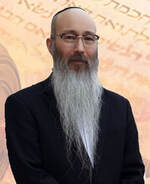|
By: HaRav Menashe Sasson Reporting from Jerusalem, Israel Published in the U.S.A. Man Was Created to Toil [כי-אדם לעמל יולד]. Iyyob 5:7. Likewise, the Talmud states: “Rabbi Elazar says: Every man was created for labor, as it is stated: ‘Man is born for toil.’” Masekhet Sanhedrin 99b. For textual evidence that Man Was Created to Toil, we need look no further than one of the opening pesukim [פסוקים] (verses) of the Torah. HaShem “took the man and put him in the garden of Eden to till it and to keep it.” Bereshit 2:15. A few perekim [פרקים] (chapters) later, HaShem tells Moshe Rabbeinu “When thou hast brought the people out of Mizrayim, you shall serve HaShem upon this mountain.” Shemot 3:12. In other words, HaShem was telling Moshe Rabbeinu that he need not fear Par’o and that after departing Mizrayim, the Jewish people would receive the Torah on Har Sinay [הר סיני]. Juxtaposing these two pesukim [פסוקים] (verses) raises the obvious question of whether man was created to engage in physical work (e.g., to till the garden. . .) or to engage in spiritual pursuits (e.g., to serve HaShem). Parashat Vayyeze opens by informing us that “Ya’aqob went out from Be’er Sheva and went toward Haran.” Bereshit 28:10. That is, Ya’aqob left his parents’ home where he had lived and studied Torah in peace his entire life. On the way to Haran, Ya’aqob stopped at the yeshiva [ישיבה] of Shem and Eber, where he studied Torah for fourteen years. The reason for this delay was to allow Ya’aqob to learn how to survive in the spiritually-hostile environment that was Haran. Shem, who had lived during the generation of the Flood, and Eber, who had lived during the generation of the Tower of Babel, were particularly suited to teach Ya’aqob these lessons. Parashat Vayyeze tells us that after leaving Shem and Eber, Ya’aqob continued on to Haran where, despite many difficulties with his wicked uncle Laban – involving both business and personal affairs – Ya’aqob married both Rahel and Le’a, fathered children, and became successful in business, which involved a joint venture with Laban. Bereshit 30:31-34. This brings us back to where we started: Man Was Created to Toil. That is, man was created to work. Just as Ya’aqob had to work, both for his benefit and for the benefit of his family, so too all of mankind was created to work. Simply knowing that man was created to work does not, of course, provide any meaningful guidance as to what occupation or profession should be engaged in by any particular man. To begin to answer this question, we need to examine the general nature of man. As Rabbi Tatz explains:
Akiva Tatz, Will, Freedom and Destiny, at 15. In other words, HaShem, being the Creator, represents the epitome of free-will, that is, the ability to choose. Man, having been created in the image of HaShem, likewise possesses free-will. Explaining the boundaries, that is, the limits, of free-will, Rabbi Tatz writes:
Id. (italics original), at 33. Choosing an occupation or profession is a decision which is qualitatively different than, for example, choosing which pair of shoes to wear or which flavor of dessert to eat, as choosing an occupation, unlike the latter choices, affects people other than the person who is making the choice. In the opening perek [פרק] (chapter) of the Torah, HaShem commanded all of mankind to “Be fruitful and multiply, replenish the earth and subdue it; and have dominion over the fish of the sea, and over the birds of the air, and over every living thing that moves on the earth.” Bereshit 1:28. To “subdue” and “have dominion over” something does not mean to destroy that something. Rather, “subdue” and “have dominion over” something means to put that something to productive, beneficial use. So, we see that to “subdue” and “have dominion over” the earth and all that is in it means, among other things, to cooperate with other human beings for the purpose of harnessing and putting to productive use all of the earth’s various resources. Cooperating with other human beings for this purpose necessarily means selecting and pursing an occupation or profession. Having thus concluded that choosing an occupation or profession is a moral choice which is made through the exercise of free-will, we now turn briefly to the question of which economic system is best-suited for creating an environment which is conducive to making this moral choice. There exist two, and only two, economic systems. Although neither system exists, or has existed, in its purest form or to the exclusion of the other system, we can identify those two systems as Socialism and the Free Market. Socialism, in very general terms, connotes an economy in which the State owns or controls business and industry. The Free Market, on the other hand, connotes a system which is based on individuals (including voluntary associations of individuals) interacting economically with others on a voluntary basis. It follows that only a Free Market affords an individual the ability – the freedom – to make the choice – the moral choice – of which occupation or profession to pursue. One of the most often-cited arguments against a Free Market economic system is the question of how, or even whether, the State should provide for those who, for whatever reason, are unable to provide for themselves. This is where the conversation typically turns to “Tzedakah” [צדקה], often translated as “charity,” but more accurately translated as “justice.” However, prior to addressing “Tzedakah” [צדקה], it’s appropriate to discuss the related concept of “nehama d’kisufa” [נהמא דכיסופא] (Aramaic) or “lechem shel busha” [לחם של בושה] (Hebrew), which in English means “Bread of Shame.” The Chakhamim [חכמים] (Sages) described receiving “unearned benefits” as the “Bread of Shame,” recognizing that the normal response to having received unearned benefits is to feel a sense of shame or embarrassment. In a similar vein, this feeling of shame or embarrassment has been analogized to a child who, as he matures, seeks independence and who wants to “do it myself.” Thus, giving an adult unearned benefits is similar to treating him as a child, that is, to shaming him. The Ramchal explained that HaShem’s “purpose in creation was to bestow of His good to another” and that HaShem “alone is the only true good.” Moshe Chaim Luzzatto, The Way of God, Sixth Revised Edition, (Feldheim 1998), at 37. In other words, given that HaShem is “the only true good” and that the purpose of creation “was to bestow” HaShem’s good[ness] on mankind, it follows that man, who was created in the image of HaShem, Bereshit 1:27, can receive HaShem’s goodness only by connecting with HaShem, which, in turn, can be done only by emulating HaShem’s middot [מדות] (lit. “measures,” commonly translated or understood to mean “character traits”), to the extent humanly possible. Since HaShem is not dependent on others, connecting with HaShem, and thus receiving His goodness, means, at least in part, being as self-sufficient as is humanly possible; that is, not partaking of the Bread of Shame through the acceptance from others of unearned benefits, regardless of whether those “others” are private individuals or the State. The Talmud is in accord, stating that “one who benefits from his hard labor is greater than a God-fearing [person].” Masekhet Berakhot 8a. It’s quite difficult to understate the importance of being financially self-sufficient. The great commentator Rashi stated that “one who is poverty-stricken is considered as if he is dead. Rashi, Commentary on Shemot 4:19. Returning to “Tzedakah” [צדקה], Maimonides sets forth a hierarchy for the giving of charity. The highest, or most preferred level, involves helping someone to become financially self-sufficient through, for example, helping him start a business or finding a job. The lowest, or least preferred levels involve the giving the poor unearned benefits, that is, the Bread of Shame. See generally, Mishneh Torah, Hilkhot Matanot Aniyim. Returning to Parashat Vayyeze, we see that Ya’aqob, by learning in the yeshiva of Shem and Eber, prepared himself spiritually to deal with the wicked Laban. After leaving the yeshiva, Ya’aqob traveled to Haran and, notwithstanding Laban’s numerous schemes, remained a holy and pious Jew who built his business and took care of his family, all while successfully fighting the corrupt influences of the secular world. Ya’aqob’s Torah learning allowed him to understand that man was created to toil; that HaShem gave, and thus expected man to exercise his, free-will; that the choice of a profession is a moral choice; and that to be poverty-stricken is akin to being dead. May we all be blessed to learn from, and successfully emulate, Ya’aqob’s example in our modern, contemporary world. שבת שלום Shabbat Shalom! Copyright © The Israel Foundation. All Rights Reserved.
0 Comments
Your comment will be posted after it is approved.
Leave a Reply. |
THE ISRAEL FOUNDATION





